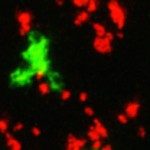Link to Pubmed [PMID] – 26371316
Proc. Natl. Acad. Sci. U.S.A. 2015 Sep;112(39):12151-6
T lymphocytes are highly motile cells that decelerate upon antigen recognition. These cells can either completely stop or maintain a low level of motility, forming contacts referred to as synapses or kinapses, respectively. Whether similar or distinct molecular mechanisms regulate T-cell deceleration during synapses or kinapses is unclear. Here, we used microfabricated channels and intravital imaging to observe and manipulate T-cell kinapses and synapses. We report that high-affinity antigen induced a pronounced deceleration selectively dependent on Ca(2+) signals and actin-related protein 2/3 complex (Arp2/3) activity. In contrast, low-affinity antigens induced a switch of migration mode that promotes T-cell exploratory behavior, characterized by partial deceleration and frequent direction changes. This switch depended on T-cell receptor binding but was largely independent of downstream signaling. We propose that distinct mechanisms of T-cell deceleration can be triggered during antigenic recognition to favor local exploration and signal integration upon suboptimal stimulus and complete arrest on the best antigen-presenting cells.
